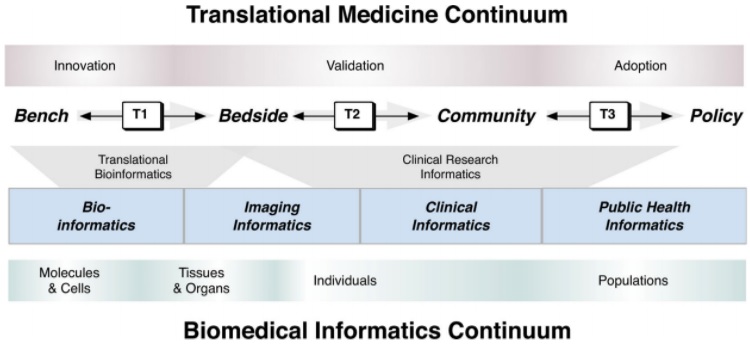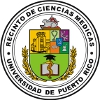Clinicians can benefit from Bioinformatics and Health Informatics for the development of research and tools for new treatments and insights towards the improvement of health across populations.
Translational Research
 Source: Biomedical informatics and translational medicine
Source: Biomedical informatics and translational medicine
Bio-informatics: to identify molecular and cellular regions that can be targeted with specific clinical interventions or studied to provide better insights to the molecular and cellular basis of disease.
Imaging informatics: to visualize approaches for understanding pathogenesis and identification of putative treatments from the molecular, cellular, tissue or organ level.
Clinical informatics: to improve patient care through the availability and integration of relevant information at the point of care.
Public health informatics: to meet population based needs, whether focused on the tracking of emergent infectious diseases, the development of resources to relate complex clinical topics to the general population or the assessment of how the latest clinical interventions are impacting the overall health of a given population.
The future of biomedical informatics depends on the ability to leverage common frameworks that enable the translation of research hypotheses into practical and proven treatments. Some of the key biomedical informatics topics that are of relevance for translational medicine are: Decision Support, Natural Language Processing and Electronic Health Records.
Tutorial for Clinicians
The following tutorials are useful resources with basic information related to bioinformatics and related fields:
Coffee Break: A resource at NCBI that combines reports on recent biomedical discoveries with use of NCBI tools. The result is an interactive tutorial that tells a biological story. Each report is based on a discovery reported in one or more articles from the recently published peer-reviewed literature. After a brief introduction that sets the work described into a broader context, the report focuses on how a molecular understanding can provide explanations of observed biology and lead to therapies for diseases.
Each vignette also highlights the NCBI tools and resources used in the research process. These tools include PubMed, PubMed Central, Entrez Gene, and MapViewer.
Coffee Break articles should be fun and informative reading for molecular biologists, clinicians, and students, and may serve as teaching aids for college and graduate students.
NIH Online Bioinformatics Tutorials: A is a collection of expert-authored, peer-reviewed disease descriptions on the NCBI Bookshelf that apply genetic testing to the diagnosis, management, and genetic counseling of patients and families with specific inherited conditions.
NCBI Clinical and Medicine Resources
ClinVar: A resource to provide a public, tracked record of reported relationships between human variation and observed health status with supporting evidence. Related information in the NIH Genetic Testing Registry (GTR), MedGen, Gene, OMIM, PubMed and other sources is accessible through hyperlinks on the records.
GeneReviews: A collection of expert-authored, peer-reviewed disease descriptions on the NCBI Bookshelf that apply genetic testing to the diagnosis, management, and genetic counseling of patients and families with specific inherited conditions.
Genetics Testing Registry (GTR): A voluntary registry of genetic tests and laboratories, with detailed information about the tests such as what is measured and analytic and clinical validity. GTR also is a nexus for information about genetic conditions and provides context-specific links to a variety of resources, including practice guidelines, published literature, and genetic data/information. The initial scope of GTR includes single gene tests for Mendelian disorders, as well as arrays, panels and pharmacogenetic tests.
MedGen: A portal to information about medical genetics. MedGen includes term lists from multiple sources and organizes them into concept groupings and hierarchies. Links are also provided to information related to those concepts in the NIH Genetic Testing Registry (GTR), ClinVar, Gene, OMIM, PubMed, and other sources.
Online Mendelian Inheritance in Man (OMIM): A database of human genes and genetic disorders. NCBI maintains current content and continues to support its searching and integration with other NCBI databases.
Database of Genotypes and Phenotypes (dbGAP): An archive and distribution center for the description and results of studies, which investigate the interaction of genotype and phenotype. These studies include genome-wide association (GWAS), medical resequencing, molecular diagnostic assays, as well as association between genotype and non-clinical traits.
Resources and Tools
- Most popular Bioinformatics and Health Informatics tools used in Biomedical Research
- Most used Electronic Health Records in Puerto Rico
- Most popular Bioinformatics and Health Informatics scientific organizations
- Certifications
- Research groups in Puerto Rico
- Most popular Bioinformatics and Health Informatics journals
- Tutorials and Courses
